
I’m reading reports about the US banning certain Chinese companies, and thought about the implications for 3D printing.
The most prominent company in the news lately is TikTok, the social media network that exploded on the scene in the past couple of years. The system’s mysterious proprietary algorithm has been able to draw in a massive audience.
However, that algorithm is also what US legislators are concerned with: could it be used to influence public opinion in the West? Although the company’s HQ is in Singapore, it does have significant connections to China, where many companies are beholden to the government.
Last week the US congress voted on and passed a large bill that, among other things, requires TikTok to be sold off within nine months or face a ban in the US. TikTok later responded saying they will not sell, so it should be interesting to see what happens next.
Meanwhile, the focus on China influence now turns to other companies, and one of the most prominent is DJI. The Shenzhen-based company is the world’s largest manufacturer of drones for both consumer and business use. The company almost single-handedly transformed that industry from a DIY hobbyist market into a true consumer and industrial product.
However, as with TikTok, some fear DJI’s business is a potential threat to the US. This is understandable, as all flights are recorded on DJI’s cloud system, which is most likely located in China.
There is no legislative proposal as yet to address DJI, but it would not be surprising if a bill did appear sooner or later. If so it could be quite catastrophic for the drone market, as there are few products as prominent — and affordable as DJI’s.
If the US congress gets into the habit of torching Chinese companies in this manner, then we have to consider the strong presence of many Chinese 3D printer manufacturers not only in the US, but also the rest of the world.
Companies like Creality, Anycubic, Bambu Lab, FlashForge, Artillery, Qidi, Longer, and many more are all based in China. It could be that a large majority of all desktop 3D printers on the planet are manufactured by these Chinese-based companies.
Some, like Anycubic, Creality and Bambu Lab, are based in Shenzhen, just like DJI. In fact, Bambu Lab was founded by engineers that came from DJI, and the company’s strategy seems eerily familiar to the DJI story: transform a DIY hobby industry into a true consumer market.
Most of these companies have (or are) building cloud-based systems to provide ease-of-use features for their equipment. These online ecosystems filled with 3D models for immediate printing, as well as a number of features to make the experience sticky.
Should the US Congress set their eyes on the desktop 3D printer market in the same way they viewed TikTok and may view DJI, we may see a very severe shakeup in the 3D printing market.
At this stage the market momentum is toward the inexpensive and increasingly powerful Chinese machines, with fewer options outside of China that are usually more expensive. Shutting that off would be a very big deal in our 3D print world.
On the other hand, none of this may happen at all. It took years for the TikTok ban, and would take even more time for 3D printing.
Via The Verge
